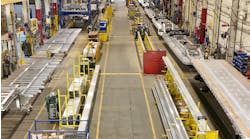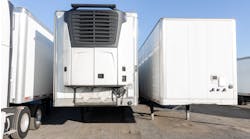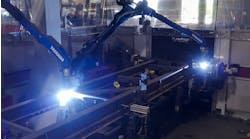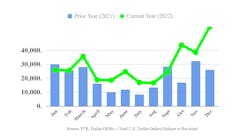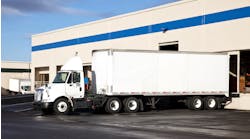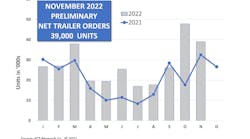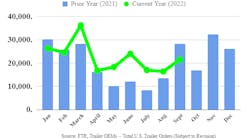It seems almost too good to be true. Almost every truck trailer manufacturer in the United States increased production in 1997, and the few that didn't chose to be more selective and concentrate on higher revenue production.
The Department of Commerce figures for the truck trailer industry seem especially high. Total shipments show over 271,500 complete trailers in 1997. This is three percent less than the all-time record year of 1995.
However, it must be remembered that the 271,500 trailers reported is just a preliminary total obtained by adding the 12 monthly reports for 1997. In the previous year, this preliminary report was cut by 10% when Commerce came out with its final figure. A 10% cut in the 1997 total would put it under 245,000 complete trailers.
If the Commerce report is true -- and that is a big IF -- the top 25 trailer manufacturers whose production is reported here had a combined market share of 79%. The top five manufacturers built just over half (51%) of the trailers, and the top ten produced almost two-thirds (64%) of the trailers.
The biggest change in the top ten trailer manufacturers is the addition of three new manufacturers replacing companies that either merged or dropped out following bankruptcy sale.
Wabash National Corporation remains the world's largest trailer manufacturer, and now it is even larger with the addition of the former Fruehauf plants. Fruehauf had been the largest trailer manufacturer until 1989, and in 1996 it was ranked sixth largest.
Great Dane Limited Partnership is the second-largest, and this year it combines Great Dane and Pines Trailer figures for the first time. Pines was tenth-largest in 1996 and ranked eight in 1995.
Monon Corporation was ranked fifth in 1996, but it was sold in bankruptcy and reopened by the new owners as HPA Monon Corp. It started production May 15, 1997, so the 7 1/2 months production earned it the number 18 spot. Here is how the 25 largest manufacturers placed during 1997, the second-best year industry-wide:
Wabash National Corporation built 48,214 complete trailers in 1997, plus 92 containers chassis and 40 containers. This represents 12 months output from three plants: the large Wabash plant in Lafayette, Indiana, plus the two former Fruehauf Trailer plants in Fort Madison, Iowa, and Scott County, Tennessee. The 48,214 complete trailers represent a 32% increase above Wabash's 1996 production, and also a 6% increase above the combined total production in 1996 of Wabash and Fruehauf.
Wabash President Jerry Ehrlich says that 1998 is shaping up to be an even better year. The company began the year with a backlog of some $800 million, which could be construed as almost a year's production. However, Wabash produced $268 million in the fourth quarter, in spite of 10% fewer production days, so the company is producing at an annual rate over $1 billion. Most analysts are predicting that Wabash will have revenues of $1.2 to $1.3 billion in 1998.
Operating margins in the fourth quarter were at the highest level in two years, according to Ehrlich, and gross margins are at the highest level ever for Wabash in terms of both the dollar amount and percentage.
Wabash now has its composite plate sidewall panel plant on stream. Located in a new building adjacent to the van trailer assembly building, it has relieved the bottleneck created by panel shortages when the new sidewall material was supplied by an outside vendor. In addition, the Fort Madison plant is capable of building both Fruehauf and Wabash branded vans. The Scott County plant is building both Fruehauf and Wabash platform trailers as well as dump trailers.
Great Dane Limited Partnership manufactured 37,237 complete trailers in 1997, plus 851 containers and 119 converter dollies. This is the combined output of eight plants -- the five Great Dane plants plus three plants of the former Pines Trailer Limited Partnership. It represents a 14% increase over the 1996 production from Great Dane and Pines plant before the merger.
The five Great Dane plants completed 29,655 trailers in 1997, up 15% from the 1996 output, plus 351 containers and 119 dollies. The former Pines Trailer plants built 7,582 trailers in 1997, up 8 1/2%, plus 500 containers. The Pines van total counting containers is 8,082, which is 15% above Pines' 1996 production.
Utility Trailer Manufacturing increased trailer production by 17% in 1997. Of the 23,084 complete trailers built, 49% were refrigerated. Thus, Utility Trailer retains its position as the largest manufacturer of reefer trailers with about a 42% market share. However, the company's biggest increase was in dry freight vans. Utility expects to increase its freight van business again in 1998, as well as refrigerated trailers, flatbeds, and curtainsiders.
Trailmobile Corporation shipped 18,239 complete trailers in 1997, which is 65% above its 1996 output. However, it must be remembered that Trailmobile's main plant in Charleston, Illinois, was down for six months during a strike in 1996. About a fifth of Trailmobile's production was refrigerated trailers, and 8% was flatbeds. Jay Nieszel, VP-sales and marketing, said that after the strong showing in the second half of 1997, he expects Trailmobile to build 21,000 trailers in 1998.
Stoughton Trailers Inc shipped 11,700 complete trailers in 1997, a 33% increase above 1996 output. Stoughton also built 5,100 containers and 3,000 chassis (including some platforms). These figures include the refrigerated containers and trailers built by Stoughton Composites in Brohead, Wisconsin.
Strick Corporation built 11,000 dry freight vans in 1997, up 42% from 1996 when production dropped precipitously. Strick also built 5,000 chassis. President Densil Williams says demand remains strong. The company is operating three plants -- Danville and Berwick, Pennsylvania, and Monroe, Indiana. Strick's plant in Casa Grande, Arizona, remains closed.
Dorsey Trailers Inc shipped 7,939 complete trailers, down 8% from the 1996 figure. About 10% were refrigerated and 15% were platforms. Dorsey also shipped 25 converter dollies. CEO Marilyn Marks said that Dorsey showed a net income of $215,000 in the fourth quarter, although the company has a loss of $10 million for the full year. Improved pricing and a strong market resulted in the best gross margins since the third quarter of 1995. For example, net sales were $157 million in both 1996 and 1997, but 8% fewer trailers were built in 1997.
Manac Inc produced 6,486 complete trailers in 1997, selling into a strong Canadian market. Manac's production was 68% more than in 1996 and 18% more than 1995. That makes it one of the few companies to produce more trailers in 1997 than in the all-time record year of 1995.
Lufkin Trailers built 5,785 complete trailers and 18 converter dollies, up 60% from 1996 but off 5% from the 1995 record year. About 75% of the Lufkin production was in van trailers and another 20% in platforms. The company is opening a new assembly line for chip vans in May.
Transcraft Corporation shipped 4,509 platform trailers in 1997, which is 43% more than in 1996 and 26% above its 1995 production. Thus, Transcraft is one of the few trailer manufacturers to increase over both years. Much of the increase is from Transcraft's new Eagle plant in Mt Sterling, Kentucky, where production is now at nine a day. Steel platforms are built in the Anna, Illinois, plant.
Mond Industries Inc, selling only in Canada, sold 3,934 complete trailers in 1997, up 13% over 1996 and up 33% over 1995. About 80% of these were dry freight vans and another 15% were refrigerated trailers. In addition, Mond produced 528 domestic containers. Bert Clay, VP-sales & marketing, says Mond has a 15% sales increase in 1997, with total sales of $90.7 million.
Hyundai Precision America shipped 3,445 complete trailers (dry freight vans), a 72% increase over 1996. Based in San Diego and having production facilities across the border in Tijuana, Mexico, Hyundai's real strength is in container and chassis production. The company built 9,594 container chassis and 6,954 domestic containers, 48 and 53 feet long. In addition, Hyundai built 2,936 refrigerated ISO marine containers, all 40 feet long. Container production is usually measured in TEU (twenty-ft-equivalent units). Hyundai's production of long containers adds up to over 23,000 TEU.
Trail King Industries Inc built 3,385 truck trailers with axles above 10,000-lb capacity, plus 588 having axles under 10,000-lb capacity. Not counting the lighter weight trailers, Trail King's production was up 21% over 1996 and 10% over 1995. Trail King may build more lowbeds than any other manufacturer, as well as a broad variety of construction and commercial trailers including tag machinery trailers and bottom dumps and end dumps. President Jerry Thomsen describes 1997 as an "awesome year" and thinks 1998 will be every bit as strong.
Road Systems Inc of Searcy, Arkansas, a wholly owned subsidiary of CNF Transportation, produced 3,329 van trailers in 1997. This includes 2,149 new vans and 1,180 remanufactured vans. In addition, the company built 150 new converter dollies and rebuilt 353 dollies.
Heil Trailer International shipped 3,219 tank trailers in 1997. This is 9% more than its 1996 shipments and 10% more than in 1995. Heil builds a complete line of aluminum, steel, and stainless steel liquid tanks and dry bulk trailers and containers. It commands about a 48% market share of the tank segment, based on Department of Commerce figures.
HPA Monon Corporation was in production for only 7 1/2 months in 1997, following start-up May 15 after the acquisition by HPA Partners. In those 7 1/2 months, HPA Monon produced 2,534 complete trailers, 846 chassis, and 500 converter dollies. The old Monon Corporation that went into bankruptcy in 1996 had been the fifth-largest trailer manufacturer, building some 10,000 to 20,000 trailers a year.
Kentucky Manufacturing Company shipped 2,405 complete trailers, down 20% from 1996. Most of these are drop-deck specialized vans. Kentucky has been getting out of the extremely competitive dry freight van business and specializing in the more profitable end of the business, according to Larry Hartog, president.
Timpte Inc produced 2,403 trailers, a 9% increase over 1996 and a 31% increase over 1995. President Kenny Allred says the growth at Timpte has been in other types of bulk trailers besides grain hoppers, such as self-unloading shuffle-floor trailers and belt trailers. The Canadian market has been a source of increase, and he looks for more growth there.
East Manufacturing Corporation produced 2,282 complete trailers in 1997. This is 27% more than its 1996 production, and up 6% compared to the record year of 1995. East specializes in aluminum dump and transfer trailers, aluminum platforms, and composite aluminum-steel platforms.
Alloy Trailers Inc shipped 1,881 trailers, almost all of them 53 feet long. This is 13% fewer than Alloy shipped in 1996. One of the reasons was the worst winter weather in the Northwest in recorded history. The company lost three weeks production in the first quarter due to weather. Alloy also produced 95 converter dollies and 35 specialized 3-axle and 4-axles container chassis to handle 14-ft high containers.
In spite of the unite decline, it was a relatively good year in terms of dollar volume, according to CEO Kingsley Novell. He says the company had a comfortable backlog of four to five months at theend of the year, and he is looking for another good year in 1998. For those predicting a decline in trailer production after antilock braking is mandatory on new trailers beginning March 1, Novell says over 85% of his customers are ordering the ABS before it is required.
Polar Tank Trailer Inc shipped 1,690 tank trailers in 1997, up 8% above the 1996 shipments. Although tank and dry bulk trailer sales are down industry-wide, the last three to four months have shown improvement, says Jim Jungels, Polar president. Polar builds all types of dry bulk and liquid tank trailers in three plants in Minnesota and Missouri.
Ravens Inc built 1,488 trailers in 1997, up 6% above the 1996 production and 1% above 1995. Ravens builds primarily aluminum trailer flatbeds in Ohio and dump trailers in North Carolina.
Clement Industries built 850 dump trailers in 1997, about 6% above its 1996 production. Clement may be the smallest of the top 25 trailer manufacturers, but President Glen Hicks says it is the largest dump trailer manufacturer. Clement builds all type of dump trailers -- bottom dumps, end dumps, roll-off carriers, and chip trailers.

